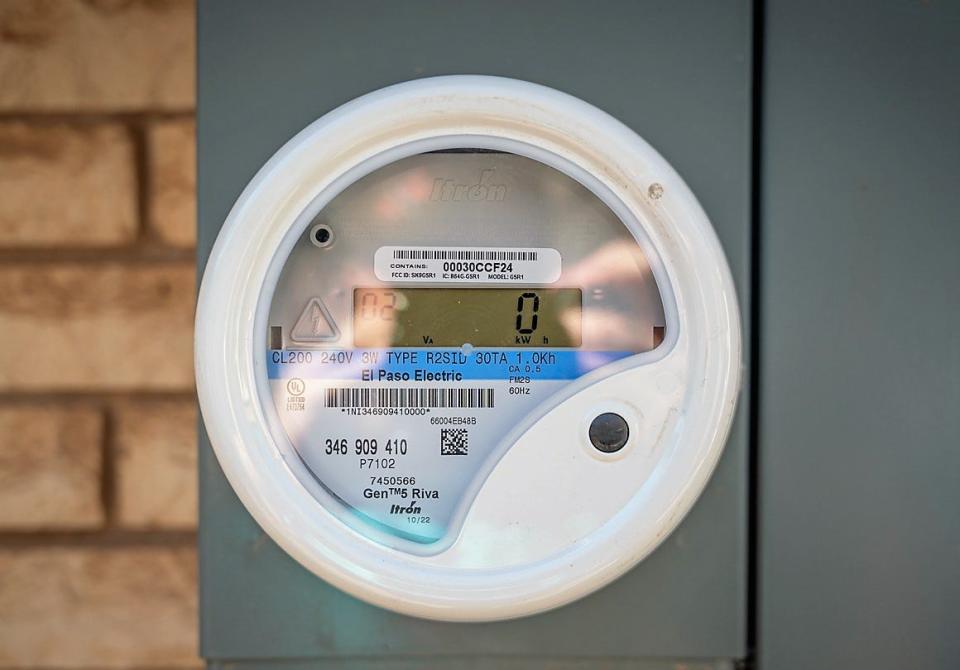Smart electric meters are coming to Rhode Island. Here's why.
Smart meters, technology considered essential to modernizing the power grid, are coming to Rhode Island.
State regulators on Wednesday approved a $153-million plan for Rhode Island Energy to replace over the next decade 525,000 outdated meters at homes and businesses with new devices that would allow the company and its customers to monitor usage in close to real time.
Rhode Island Energy, the largest energy supplier in the state, says the investment is necessary to efficiently manage power distribution as more renewables are connected to the grid. And the company argues that the time is right to make the change, because the most of the meters currently installed across Rhode Island are reaching the end of their useful life.
The three members of the Public Utilities Commission agreed on both counts, and unanimously approved the proposal, though they scaled it back from the original $188-million cost.
“We’re hoping the company does go forward with it. It’s an important project,” said commission chairman Ronald Gerwatowski.
Rhode Island Energy applauded the decision and said customers can expect to start seeing the new meters late next year.
The commissioners agreed that there is a net benefit to the project, but they acknowledged that there are questions around some of the numbers presented by the company.
“The value case, I believe, is not a slam dunk, but I think we can make up for it with accountability,” said commissioner Abigail Anthony.

What are the benefits of smart electric meters?
Rhode Island Energy estimates the benefits will total $729 million over the next 20 years. The Division of Public Utilities and Carriers, the sister agency to the commission, however, puts the number much lower at $266 million.
The benefits would come from savings from faster outage notifications; fewer field investigations and reduced staff levels; avoided energy costs; climate and public health benefits realized through lowered greenhouse gas emissions; and, eventually, time-variable electric rates.
In large part, the improvements in grid management associated with the new meters would come from the amount of information they would be able to transmit to Rhode Island Energy. Current meters use wireless transmitters to send usage information to company trucks that drive past them once a month. The smart meters would relay data every 15 minutes to a central facility and automatically deliver alerts in the event of outages or other anomalies.
The company says the technology would speed up outage notification by an average of 22 minutes. The claim is at the heart of Rhode Island Energy’s estimate of benefits.
“We’re going to hold them accountable to delivering on this outcome,” Anthony said.
In general, smart meters can help electric customers reduce their usage by giving them detailed data on bill impacts from specific appliances and actions.
They also enable utilities to offer rates that vary over the day based on system demand. When demand is low, utilities can lower rates, which is especially important to people who need to charge electric cars.
And at hours when demand peaks, utilities can bump up rates to deter usage and better reflect actual energy costs. Tamping down demand over the long term can help push off costly upgrades to wires and poles.
RI Energy says customers across the country happy with their new meters
At a hearing last spring, opponents to the company’s proposal raised concerns about negative health effects caused by the radio frequencies the meters use to send out information. Gerwatowski said Wednesday that no evidence was presented in the docket to support those assertions.
Smart meters have been installed across much of America already. More than 50 electric utilities are using the technology, with some 102 million smart meters in use nationwide, according to filings made by Rhode Island Energy.
Rhode Island Energy’s parent company, PPL, is one of the utilities that has experience with the technology. The company deployed a first generation of smart meters in Pennsylvania from 2002 to 2004 and replaced them with more advanced models from 2016 to 2019. A similar deployment started in Kentucky last year.
The company says that system reliability and customer satisfaction scores have increased in Pennsylvania with the new meters.
From a big-picture perspective, Rhode Island Energy says that smart meters are needed as the power grid transitions from a traditional model in which energy is delivered only from a few large power plants to one in which many smaller solar or wind projects contribute and even homes and businesses generate their own power.
“These changes have caused a shift from the traditional one-way flow of electricity from the utility distribution system to the customer to a two-way power flow that is more dynamic and less predictable,” Rhode Island Energy president David Bonenberger said in written testimony.
The 2021 Act on Climate, which requires the state reach net-zero emissions by 2050, only accelerates the change to the energy system.
“To protect electric system safety and reliability and keep pace with this transformation, Rhode Island Energy must invest in the development of a safer and modernized grid that provides advanced functionality, such as more frequent system information for grid operators and more granular billing and usage information for customers,” Bonenberger continued.
How much will the smart meters cost customers?
The cost to customers would initially be incremental, at 7 cents a month for the typical household and would gradually rise under the original proposal to no more than $4. The company says it is recalculating the bill impacts under the new price cap set by the commission.
This article originally appeared on The Providence Journal: Smart meters for RI Energy customers: What the change

